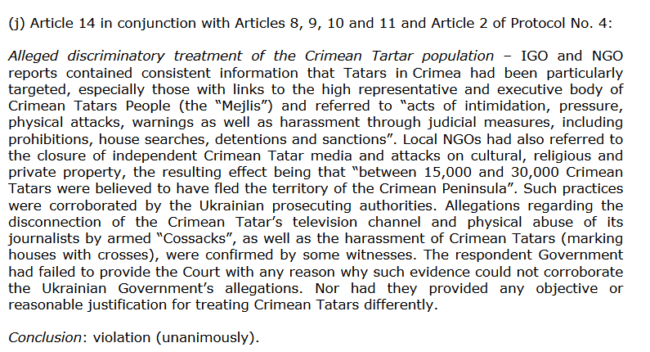On June 25, 2024, the European Court of Human Rights (ECtHR) issued its judgment on the case of Ukraine v. Russia (re Crimea), on complaints from 2014 and 2018 concerning a pattern of human rights violations in Crimea. The 17-judge panel unanimously found Russia guilty of having violated 11 articles of the European Convention for the Protection of Human Rights and Fundamental Freedoms, Articles 1 and 2 of Protocol 1, and Article 2 of Protocol 4 to the Convention since the seizure of Crimea in February 2014:
The ECtHR recognized Russia’s responsibility for the events in Crimea from the first day of the annexation, from 27 February to 18 March 2014 (date of signature of the “Accession Treaty” of the Republic of Crimea to the Russian Federation), and that Russia’s “effective control” of Crimea was based on the military involvement of Russian armed forces in Crimea. The ECtHR also found that the claimed violations should be considered as violations of the International humanitarian law – The Fourth Geneva Convention (the Protection of Civilian Persons in Time of War), and quoted a number of provisions on the obligations of the “occupying authorities”/”occupying forces” to respect certain rights in the “occupied territory”.
Margaryta Sokorenko, Ukraine’s Representative on ECtHR Matters, said:
“This is the first case when an international court has found the Russian Federation responsible for the policy of wide-scale and systematic violations of a number of human rights and freedoms in occupied Crimea and Sevastopol. This judgement is unique, with the ECtHR recognising a number of violations for the first time in its jurisprudence – Russia’s unlawful application of its legislation in the occupied territory; unlawful “courts”; enforced change of citizenship. This is particularly important as Russia commits all the same violations in any part of Ukraine under its occupation”.
In the judgment, the Court stated that it had sufficient evidence of violations by Russia – in particular, reports by intergovernmental and non-governmental organisations, corroborated by witness testimony and other materials – to conclude beyond reasonable doubt that the cases of violations of the rights and freedoms of Ukrainians and Crimean Tatars living in Crimea were sufficiently numerous and interrelated to constitute a practice or system of violations.

ADC Memorial, together with Ukrainian and Russian human rights organisations, has documented violations of the rights of Crimean residents since 2014, including discrimination against the Crimean Tatar and Ukrainian population of the occupied peninsula. The reports were submitted to the relevant UN HRC Committees (Committee on the Elimination of Racial Discrimination, HRC, Special Rapporteurs, UPR), as well as informed the Advisory Committee of the Council of Europe about violations of the Framework Convention on the Rights of National Minorities by the Russian Federation. The persecution of vulnerable groups – LGBTI people, Crimean Tatars, Ukrainians – since the annexation of Crimea has been described in detail in our reports:
2016
2017
- The Russian Federation: Violation of the Economic and Social Rights of Vulnerable Groups (pр. 17-22)
- Racism, Discrimination and Fight Against “Extremism” in Contemporary Russia and its Controlled Territories (pр. 12-27)
2019
2020
2021
- Discrimination and Persecution of the Crimean Tatar People in 2014-2021 for the UN Special Rapporteurs on Human Rights
- An overview of the situation of some ethnic minorities in the region of Eastern Europe and Central Asia (pp.2-3) for preparing the report of the UN High Commissioner for Human Rights “Effective promotion of the implementation of the Declaration on the Rights of Persons Belonging to National or Ethnic, Religious and Linguistic Minorities”
2023
- Joint report on the situation in Russia in the frame of the UPR: racism and discrimination based on ethnicity, migration status and citizenship (pр.4-6)
- Racism in Russia: Report of ADC Memorial and International Committee of the Indigenous Peoples of Russia to the UN CERD (pр.8-11)
Following its expulsion from the Council of Europe on 16 March 2022, Russia has ceased communication with the ECtHR and has refused to enforce any ECtHR judgments. However, the ECtHR’s legal judgement Ukraine v. Russia (re Crimea) will influence further policy towards Russia’s aggression against Ukraine and judicial decisions on the other cases and lawsuits filed against Russia in international institutions (the ECtHR has received more than 7,000 individual complaints related to Russia’s aggression since 2014).
The Court’s judgement confirms that repression and discrimination in Crimea are part of a large interconnected campaign of political repression implemented by Russia in the annexed territory, aimed at stifling any political opposition to Russian policies in Crimea and entailed systematic violations of civil rights and freedoms.









 Feedback
Feedback